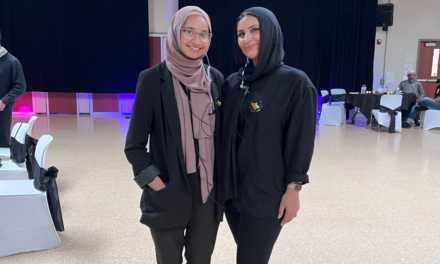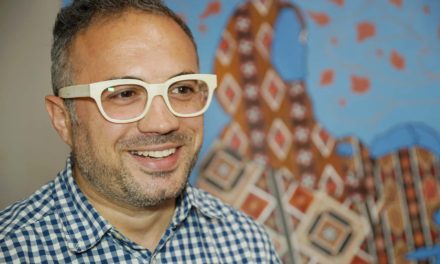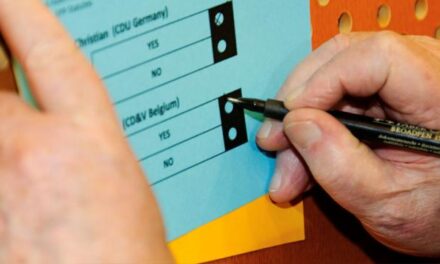Muslim students at the University of Wisconsin – Milwaukee share a meal.
Photo @
Muslim Student Association (UWM)
This article is the first in a two-part series that looks at how policies and practices at universities in Wisconsin are impacting Muslim students and changing campus cultures.
Ramadan is coinciding with the end of the university academic year. That means many Muslim students are under pressure to perform on exams, presentations and class projects while fasting from any food or drink for more than 15 hours a day.
Their parents and grandparents remember what it was like for them. Telling the Muslim equivalent of “walking 10 miles to school, barefoot in the snow,” the older generations talk about a time when their professors had never heard of Ramadan. If they had, the idea of adjusting exam schedules or making other accommodations for a handful of students practicing an obscure religion was out of the question.
“Times have changed,” said Sameer Ali, the Muslim chaplain at Marquette University, where Muslim students make up about 1 % of the total student body. “There is more advocacy and awareness among students, faculty and staff than when I was an undergraduate student at another university in the early 2000s,” he said.
Many educators in Wisconsin universities and colleges today are asking: Why would we force our students to choose between practicing their faith and performing well academically? Why would we assess their learning under exceptionally challenging conditions?
Universities, statewide and nationally, are answering these questions by changing policies and practices to better honor religious observations of increasingly diverse student bodies. In the process, students, faculty and staff are learning more about the Muslim faith and the meaning of Ramadan.

Muslim Student Associations create a sense of community on campus.
University policies call for accommodating religious practices
The University of Wisconsin System has a policy on the accommodation of religious beliefs (UWS 22), first registered into state law in 1993 and updated in April 2016, that says “students’ sincerely held religious beliefs shall be reasonably accommodated with respect to all examinations and other academic requirements.” That includes “permitting students to make up any examination or other academic requirements at another time or by an alternative method, without any prejudicial effect,” as long as students notify the instructor at the beginning of the semester. Students’ requests should be kept confidential and “the sincerity of the student accepted at face value.”
UW-Madison’s graduate school’s policy clearly directs instructors to accommodate students’ religious observances. It states:
A student’s claim of religious conflict should be accepted at face value. A great variety of valid claims exist for religious groups, and there is no practical, dignified, or legal means to assess the validity of individual claims. State law mandates that any student with a conflict between an academic requirement and any religious observances must be given an alternative means of meeting the academic requirement. The law also stipulates that students be given means by which they can conveniently and confidently notify an instructor of the conflict.
Private universities in the state are in varying stages of establishing policies. For example, Mount Mary University in Milwaukee finalized a policy that went into effect in the fall of 2020. It codified practices already widely occurring on campus, said Dr. Donald Rappé, a professor of theology and chair of the Faculty Assembly.
MMU’s policy requires that “faculty make every effort to deal reasonably and fairly with all students who, because of religious obligations, have conflicts with scheduled exams, assignments or required attendance. In so doing, faculty are careful not to inhibit or penalize those students who are exercising their rights to religious observance.”
“I can tell you that even before this policy, this was the default position of all the faculty that I know,” said Dr. Rappé. “We want to help the students succeed and knowing there are circumstances – whether religious observance or single parents or some dire situation in the family – we try to adapt within reason without lowering our standards.
“We are a very diverse place and this kind of accommodation is very much in line with our Catholic identity,” he said, adding, Muslim students who are practicing their faith are in pursuit of “Truth with a capital T,” and it is natural the faculty would support them.

Likewise, at Marquette University, a Catholic institution in Milwaukee, faculty are encouraged to “honor religious practices and to honor what religious diversity brings to our campus,” said Dr. William Welburn, vice president for inclusive excellence. Dr. Welburn is responsible for leadership in setting a strategic direction on campus diversity and inclusion by working with faculty, administrative, staff and student communities on a range of issues leading toward a more inclusive Marquette.
“One thing I find very important at Marquette, there is a big institutional commitment to religious diversity,” Dr. Welburn said. Marquette has had a Muslim chaplain since 2017 and it offers a prayer space. “I’d venture to say most colleges and universities are not as nimble as we would like to be in honoring religious practices and holidays on a very pragmatic level. We are doing a lot that is important but there is a lot more we can do. There’s the next step we can take.
“It is incumbent upon the faculty and students to understand that just because a religious observance falls in the final week of the semester, it is still critical that we recognize its importance.”
Dr. Jennifer Maney, MU’s director of the Center for Teaching and Learning, has been providing support to Marquette faculty in creating inclusive classroom environments. She sent an email this week to all faculty members, reminding them that some MU students are observing Ramadan and fasting from sunrise to sunset.
“Our Muslim students observing this holy month may face challenges with end-of-the-semester stressors, including exam times set later in the day. In addition, Eid al-Fitr, an important feast celebrating the end of Ramadan, is likely to begin at sunset on May 12 and conclude at sunset the next day. Students may be contacting you about these matters and seeking support,” she wrote. She urged faculty members with any questions to contact her directly.
“We have an obligation to help faculty understand the nuances of identity,” she explained. She said she wants the opportunity to remind faculty members that a student may not want others to know they are fasting and that some, especially first-year students, may feel intimidated about asking for accommodations. Also, teachers may not know what they can and can’t do to support the students.
“If we are going to take being an inclusive campus seriously, these are exactly the kinds of things we have to wrestle with.”














